Tibialis posterior muscle
The tibialis posterior is the most central of all the leg muscles, and is located in the deep posterior compartment of the leg.
| Tibialis posterior muscle | |
|---|---|
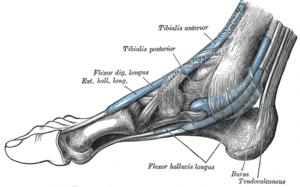 The mucous sheaths of the tendons around the ankle. Medial aspect. (Tibialis posterior labeled at top center.) | |
| Details | |
| Origin | Tibia and fibula |
| Insertion | Navicular and medial cuneiform bone |
| Artery | Posterior tibial artery |
| Nerve | Tibial nerve |
| Actions | Inversion of the foot and plantar flexion of the foot at the ankle |
| Antagonist | Fibularis brevis and longus, antagonist to the inversion. |
| Identifiers | |
| Latin | Musculus tibialis posterior |
| TA | A04.7.02.051 |
| FMA | 51099 |
| Anatomical terms of muscle | |
It is the key stabilizing muscle of the lower leg.
Blood is supplied to the muscle by the posterior tibial artery, and innervation is via the tibial nerve.
Structure
The tibialis posterior muscle originates on the inner posterior borders of the tibia and fibula. It is also attached to the interosseous membrane, which attaches to the tibia and fibula.
The tendon of the tibialis posterior muscle (sometimes called the posterior tibial tendon) descends posterior to the medial malleolus and terminates by dividing into plantar, main, and recurrent components. The main portion inserts into the tuberosity of the navicular and the plantar surface of the medial cuneiform. The plantar portion inserts into the bases of the second, third and fourth metatarsals, the intermediate and lateral cuneiforms and the cuboid. The recurrent portion inserts into the sustentaculum tali of the calcaneus.
Function
As well as being a key muscle and tendon for stabilization, the tibialis posterior also contracts to produce inversion and assists in the plantar flexion of the foot at the ankle. The tibialis posterior has a major role in supporting the medial arch of the foot. Dysfunction of the tibialis posterior, including rupture of the tibialis posterior tendon, can lead to flat feet in adults, as well as a valgus deformity due to unopposed eversion when inversion is lost.
Additional images
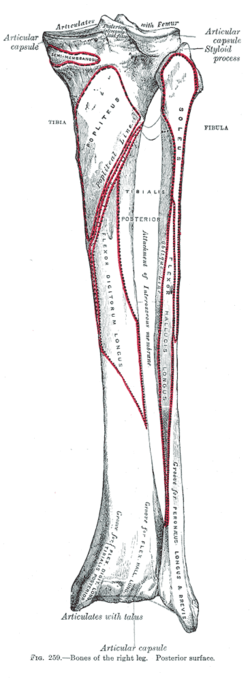 Bones of the right leg. Posterior surface.
Bones of the right leg. Posterior surface.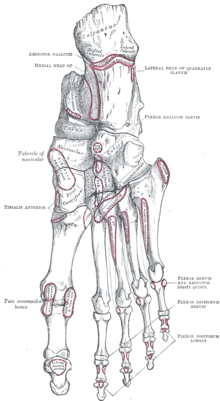 Bones of the right foot. Plantar surface.
Bones of the right foot. Plantar surface.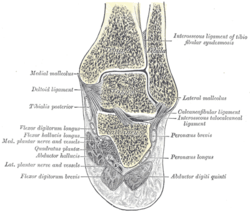 Coronal section through right talocrural and talocalcaneal joints.
Coronal section through right talocrural and talocalcaneal joints. Muscles of the back of the leg. Deep layer.
Muscles of the back of the leg. Deep layer.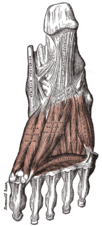 Muscles of the sole of the foot. Third layer.
Muscles of the sole of the foot. Third layer. The popliteal, posterior tibial, and peroneal arteries.
The popliteal, posterior tibial, and peroneal arteries.- Muscles of the back of the leg. Deep layer.
- Muscles of the back of the leg. Deep layer.
- Muscles of the leg.Posterior view.
- Muscles of the sole of the foot.
- Dorsum of Foot. Ankle joint. Deep dissection
- Dorsum of Foot. Ankle joint. Deep dissection.
- Dorsum and sole of Foot. Ankle joint. Deep dissection.
- Ankle joint. Deep dissection. Medial view
External links
| Wikimedia Commons has media related to Tibialis posterior muscle. |
- Anatomy photo:15:st-0416 at the SUNY Downstate Medical Center
- Diagram at washington.edu
- Diagram at latrobe.edu.au